 |
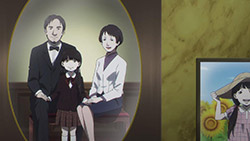 |
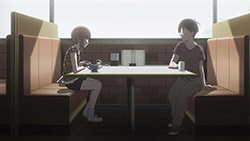 |
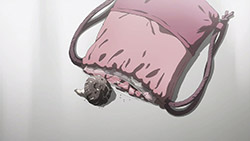 |
 |
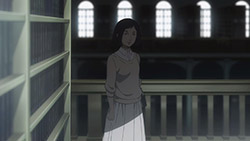 |
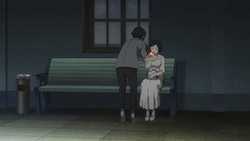 |
 |
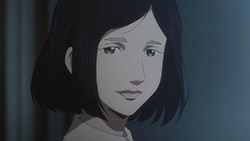 |
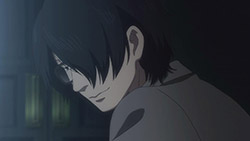 |
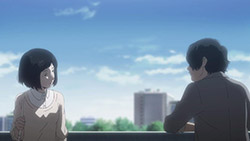 |
 |
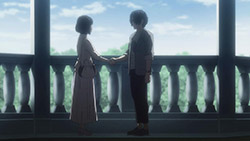 |
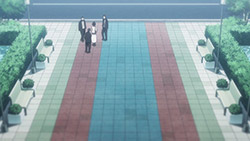 |
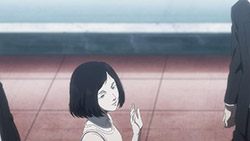 |
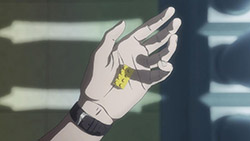 |
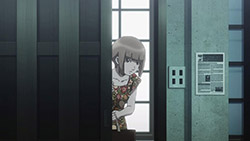 |
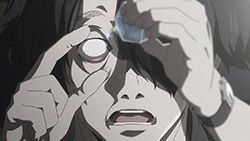 |
 |
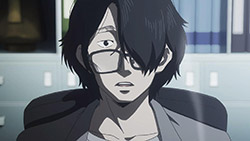 |
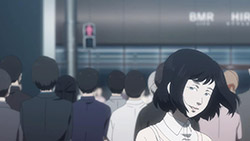 |
 |
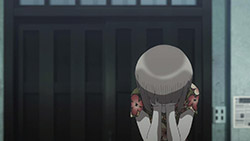 |
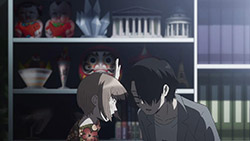 |
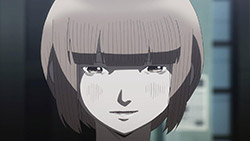 |
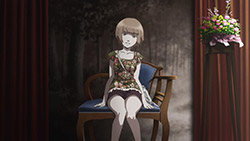 |
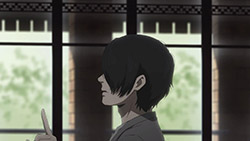 |
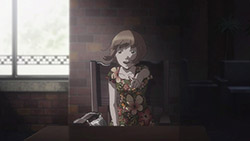 |
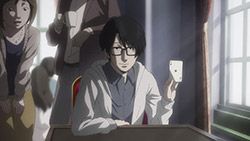 |
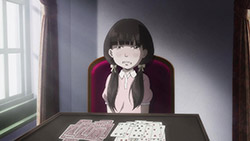 |
 |
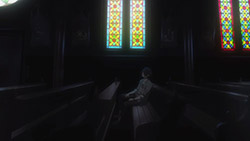 |
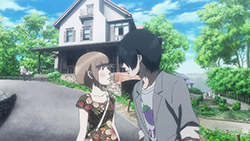 |
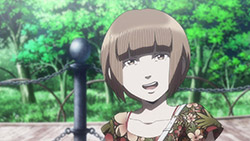 |
 |
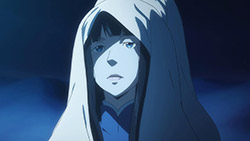 |
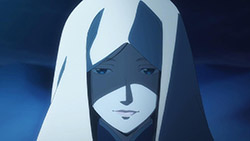 |
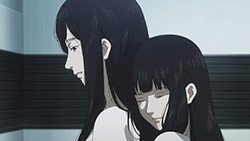 |
 |
「無色の週末」 (Mushoku no Shūmatsu)
“Colourless Weekend”
Ah, an epilogue episode. You probably know the drill for these things; loose ends are wrapped up, relationships are paired off and generally things come full circle to bookend the story. I think I’ll jump straight to the final impressions, because I mostly wanted to talk about the tale of Dr Magata Shiki as a whole and this epilogue will feed nicely into that discussion.
Final Impressions
At once the most asked and least useful question asked about a show is: ‘is it good?’. If I had to weigh on one side or another, I would say that Subete ga F ni Naru is ultimately a ‘good’ show. I found the central mystery interesting enough (although the biggest mystery is still the marimba), and when Subete ga F Naru engaged its horror aesthetics—usually when it was peeling back the curtain on the dark mind of Magata Shiki in the flashbacks—I felt the appropriate chill. Those things, it does well. But as far recommending the show goes, I should note that it is hard to frame Subete ga F ni Naru‘s quality in terms of enjoyment—not that it’s unenjoyable, but rather that it does not entertain in the same way as many other anime.
This is most telling in its cast. For example, some commenters here have voiced strong dislike for Souhei and/or Moe, and while I don’t share their vehemency, I can see where they come from. Most of the cast do not seem to be designed as ‘likeable’ people. Many other anime will strive for a likeable cast, because that’s an effective way to engage the audience with the story of these people. Unlikeable characters are usually ones we’re rooting for to lose. At the very least, heroes should be fundamentally good and decent people, but with flaws. But the cast of Subete ga F ni Naru are the inverse, in general very flawed people but maybe with some redeeming qualities. Subete ga F ni Naru is actually a very cynical show, despite a lack of overt signs like dystopian settings or mankind destroying itself. I speak for only myself here, but I prefer a bit more idealism in my fiction, since there’s plenty enough cynicism to go around in real life. But I suppose that Subete ga F ni Naru is ultimately a character study, and like in medicine there’s more to learn from the diseased than from the healthy.
And, of course, this is where we get to Dr Magata Shiki.
In a cast of overall morally and emotionally weak people, Magata Shiki stands apart. She is supposedly, as Souhei puts it, ‘pure’. She is inscrutable and untouchable. Even after her chat with Souhei, we never do really find out why she did what she did (‘to go outside’? that is, at best, a metaphor). She does talk more about her philosophy, though, and here is where I find my only major disatisfaction with Subete ga F ni Naru. Shiki says whatever she likes, Souhei accepts it all, and there’s nobody who stands as a counterpoint to her. Moe certainly never had the dialetic ability to do so and is useless to us. With some opposition, Shiki may actually have been forced to provide her logic for her assertions. Why is existence an anomaly? Why is life an illness? Why is murder love? Why do you want to be killed by another except to satisfy your own ego? While always questioning and always seeking, as Shiki instructs her daughter, is a fine precept to live by, ironically nobody ever questions Shiki properly. Without her elaboration, all I can do is to stick with my original conclusion: that Magata Shiki is ultimately just a nihilistic psychopath. There is a very fine line between enlightenment and delusion, and I am not satisfied that she is the former rather than the latter. No, her arguments aren’t cryptic, just incomplete.
See, it’s like seeing someone being wrong on the internet. Doesn’t it annoy you if nobody calls it out? I know it does. I’ve seen the flame wars.
Perhaps Shiki is just so far removed from normal human morality that we are expected to take issue with her for ourselves. Perhaps the fact that Souhei still keeps Moe, his ‘weight’, attached is the best repudiation of Maga Shiki that we can get. But in the end, Shiki manages to slip away again, escaping all the kama that she is due. Is she an ubermensch, and so is beyond our society’s petty laws and systems? Or is she a true monster, and so can never be defeated for good? I think it’s at least a good thing that Subete ga F ni Naru has challenged us to give some thought to this; I have simply decided to disagree on many points. If we were to get a presumptious and look as anime as art, making one think is a large part of it. Which is why I am pretty happy that I covered Subete ga F ni Naru: The Perfect Insider. It’s a good show.

that’s the thing: the show makes this presumptuous claim that shiki is above normal human morality; How???? when writing a story, dont make claims that you cant back up in your narrative somehow. Dont make claims that cant be illustrated or argued. You want to make your viewer be like “hmmm, i see where you’re coming from” not “What bullshit is this”. Subete ni is ultimately an intriguing but flawed series
In the spirit of Subete ga F ni Naru, I’d rather call it flawed, but intriguing. I’m wondering if Shiki didn’t have more time to explain herself in the original text. I can imagine that, limited by episode time, what was once an extended argument could have become half-baked assertions.
I presumed time management to be the case as well. But like cherrie elegantly noted below, it seems that the series composition itself also hurt the narrative. You’d think that as slowly paced as this series has been, it would have time to flesh out more important plot points and character motivations. I want more shows like this to have the opportunity to thrive in the anime space, hopefully with a bit more polish in direction, structuring, and writing in the future
I’d like to mention that this is only the third in a series of about ten novels. And the last one has a suspiciously similar title to this one. So there’s plenty of time for Magata Shiki to show up again in the novels, but sadly we likely won’t get to see it.
I’ve to say the ending is sort of like an open ending type because of Magata Shiki has escaped again while at same time, Nishinosono amd Saikawa spending time together as always: bickering over little things that somehow can reflect that little moments of enjoying life is worth it.
Every person has a different way in being alive. For Magata, she’s waiting for someone to “interfere” her life even if it means her death.
Overall, I can’t decide whether this series is a good or bad one due to viewers of the shop stating different opinions leading to mixed reviews of this show.
If anyone has noticed, there are some major changes compared to the live-action aired last year. I’m planning to think on how to review the differences between this anime and the live-action one soon.
As I mentioned in the final impressions, I’d say Subete ga F ni Naru was good, on the whole. It had its flaws, yes, but I think the good bits outweigh them. My main problem was with was with Magata Shiki, but even then it’s easy to see what she’s meant to represent: someone who just does not share the values we take for granted, be it as a sage or a sociopath.
I have a lot of mixed emotions about this show. On one hand, I really wanted to love it and I think I had really high expectations so I thought it’d be AMAZING! And then… it didn’t live up to the hype.
A few episodes in, I thought it was just way too slow for me so I watched the Jdrama instead which took a different route and had more than one case for the two characters. The drama had a much better approach imo because you see more of the interactions between Souhei and Moe and their relationship doesn’t feel so awkward and forced. It’s actually natural to see Souhei comfort Moe when her parents passed and it’s not just a one-sided crush.
Anyway, I thought the anime took a really different approach which wasn’t my cup of tea. It was definitely slow… and even when it delivered the ending, it was too anticlimactic for me. The characters were way too flat so I’m like… “Who cares at this point?” o_O Shiki was the most interesting character in this series and even so, you don’t learn enough about her motives and I would’ve loved to hear more about why she thinks she thinks this way.
So with all that said, I would recommend the drama and not the anime if you just want to get to the heart of the story. This case is solved in 2 eps in the drama! (that’s only TWO hours!) And I got more out of it than the anime. I saw Moe and Shiki as two types of “damaged” individuals with stuff in common but different approaches as to how they dealt with their issues. The drama does a good job balancing the two and diving into both their lives. The anime I felt was weighed more heavily to Shiki, and Moe just ended up being quite… brat-like the whole time =X
I only watched the anime but i agree with you 🙂 I also believe that Shiki and Moe are two sides of a coin, an antithesis of sorts. I’m strongly thinking about moving to the live series 🙂
That’s how I ultimately feel: it didn’t live up to its potential.
And actually, I almost dropped it after the first episode. It was a very boring and almost pseudo-intellectual start to the series. It wasn’t until the 2nd and 3rd episodes when it really grabbed me. It was very creepy and unhinged what Shiki was doing to her uncle, and his reciprocation for that matter. All their scenes together were really dark. It had this oppressive tone that made it kind of interesting. After a while – and when parts of the mystery were being solved – it managed to lose that tone. Also didn’t help that I never really liked Saikawa and Moe.
Shiki was interesting(read: fucked up) at the start, but for some reason, even she lost some of that mystique and edge.
But anyway, maybe I’ll check out the drama one day.
I’ll agree on the point about Magata Shiki. They spent a lot of time building her up as being all profound, only to have it all sorta deflate at the end. That said, up until Shiki’s confession, I found her character quite interesting and her scenes quite good. As long as she had that veil of mystery about her it worked well, but watching the live-action drama beforehand undermine that, I guess.
I only watched the first episode but I liked reading your thoughts on each episode. Good job.
and all the genius of dr Magata Shiki would be for naught if her prison was locked by simple bar from outside…
Once again, she was technically not a prisoner. We’re certainly believe that Shiki enjoyed her room. She just wasn’t fond of reality in general.
Wow… Magata’s charisma. Just… wow. When the violas started to play in the BG during their conversation about the ephemeral qualities of life, I almost stopped breathing, because I was so captivated by her. It almost felt like everything that happened in the past nine episodes were irrelevant. I love the fact that she escaped again, like Lisbeth Salander of the Millennium series.
~
And then of course Moe had to come back into the scene to shake me awake. I guess we could say her character has developed and she’s in a better position now… she gets to purchase Saikawa’s shirts and has learned how to eat mushrooms.
And I go with the side that the world will be a better place if Shiki is run over by a car somewhere. Something that utterly evil and psychotic can’t be allowed to wander freely. She’s already killed how many people in her life? Could be a very bloody road ahead until someone finally stops her for good.
I don’t know. I don’t see psychosis from her… All I see is truth. But perhaps that doesn’t matter.
yea i see some serious psychosis…murdering your daughter…yup; sounds pretty psychotic to me
Psychosis is defined by having a mental disconnection from reality. I would say she is more in touch with reality than anyone else.
But I understand where the disgust comes from. Her values and perceptions of the world differ vastly from those of the rest of world. And killing is against the teachings of “be fruitful and multiply.”
If there’s one thing I can unreservedly praise Subete ga F ni Naru about, it’s the music.
By the way, don’t do it mate. There’s so much to live for.
Don’t do what? Attempt suicide? You give me way too much credit.
Living is so much easier than dying. And because I’m programmed to want to live and love just like the rest of us, I think I’ll keep on living. Until the convenience of life and death are on par with each other, that is.
Knew a guy who did it, so let me spoil the ending for you: nothing gets better. It wasn’t a burden off anyone’s shoulders, and his last act was selfish stupidity. No fatal disease involved, and he was a bigger pain in the ass dead than he ever was alive. Killing is selfishness, pure and simple. You don’t want to put in any effort into any life, even your own, go live in a cave. Same result, less mess. We all get to the same place in the end, so don’t make yourself look like a fool by rushing to a stop sign.
Now, I know that this comment I’m making is SOOOOOOO totally unrelated to the show but uh, is there anyone here who’s going for Comic Fiesta today? This is mostly directed to any South-East Asian readers of RandomC, if there are even any here to begin with…
BTW, the timezone is +8 UTC/GMT. Just to letcha’ know.
Agreed with the conclusion, Subete was never bad, but it certainly wasn’t “good” either. The show fit (a little too tightly) into the border between terrible and fantastic. Subete’s mystery was well handled for the genre, but the philosophy was (at least for me) cringing. Magata’s worldview is akin to a first year philosophy student trying to sound smart and superior. The argument sounds intelligently complex, but once you dig past the superfluous and deliberately ambiguous language, you get something lacking logic and reason. What makes Magata superior? Why are those aspects superior? There is no one absolute truth to philosophy as Subete wants us to believe. The show may have a good mystery, but in the reason for its killer, Subete cracks under the pressure.
Ironically, however, the final scene with Magata and her daughter on the camel sums up perfectly existential nihilism. The best scene for me, and it only took 11 episodes to reach 😛
Perhaps a 4-episode OVA format would have suited this story better. Since the story lingered around us for so long, the audience naturally expected a conclusion that is a little bit more grand than the “life goes on” ending so many Japanese stories seem to have (must be a cultural thing). I just personally wished that the writers spent more time on Magata rather than Moe’s tantrums with Saikawa.
I’ll try my best to explain What makes Magata Shiki superior with english not as my native language. The main difference between Magata Shiki and Sohei is her way of perceive reality. I think she sees people as equations and once settled in his head, the way they act, they reason, feel, etc., there’s no need of the human body. She’s still have conversations with the people she killed, as seen for a few seconds when she goes with her daughter in the desert, and moments later she’s alone. I think somehow in her mind there’s room to develop all these personalities and establish a dialogue between them, which is what I understood as freedom to her. Freedom outside the body and explored in virtual reality.
Souhei gives her a counterpoint when he talks about how he treats Moe, waiting for a specific behavior after all his jokes, and get a opposite response from her. I think Souhei offers a limit, new ways of thinking, new eyes to see a situation, to Magata Shiki, hence its appreciation. And Souhei couldn’t do what she does, minimize a human being to only its way of thinking.
I too agree that we could have used more scenes like the camel scene to give Shiki’s world view more flesh, but alas it was not to be.
Shiki and Nishinosono are an antithesis! Polar opposites each one reaching in her own ways for Shouei the man standing in the epicenter of this fight; a fight between rationality and higher mind that has almost transcended human rationality against humanity with it’s will for love and care!
Shiki is the unattached person, who wants to simply exist in her own terms, she has reached the conclusion that her parents had to be removed of the equation so she could live the way she wanted. Yes, she’s a nihilist and also an almost emotionless being that would only care for someone if they managed to surprise her (breaking from the standard train of thought, being unpredictable).
For her the only thing that matters is the soul, the ethereal part of the human being, the body is nothing more than a temporary case.
Moe is the complete opposite, a material girl from a rich family, someone who lost her parents and then clang to her sensei. She needs human interaction, she seeks love and friendship, warmth and all of that fuzzy feeling inside.
PS – I don’t know if you realized, but Shouei managed to earn the affection of both Nishinosono and Magata Shiki because he could see through their tricks (Magata with the whole murder/escaple plan and Nishinosono with the magic card trick)
Yeah… the “winner” in the end seems to be Souhei. He has Moe around to ground him and people like Shiki nearby who are extreme versions of himself to tickle his curiosity. I’m sure people yearn to be in his position.
Yesssss! Souhei is the Main-main-character. We were led to believe that Shiki/Moe were… but no! I’m sure another suitable title for Souhei and Moe would be “Souhei and His Harem.”
Someone has already commented this on a previous episode, the series is pretty much a more grounded version of the Monogatari series.
I hope they don’t look for too much DVD sales wise because this series will not sell well. Its not the kind of series you watch and then buy the DVDs when they come out to enjoy the series all over again.
There’re still more adventures in store for Sohei (Saikawa) and Moe. Author Mori Hiroshi wrote 9 more mystery novels featuring them. Together with Subete ga F, they form the S & M (Sohei & Moe) series.
In fact, Mori’s written over 30 novels now, covering a wide variety of genres such as romance, poetry, and adventure. He’s well known among his publishers for his punctuality, never missing a deadline.
F’s author claims his financial success is largely due to royalties management, as revealed in a new book.
http://www.animenewsnetwork.com/interest/2015-12-12/the-perfect-insider-author-reveals-details-of-royalties-in-new-book/.96407
He talks about potential royalty figure he earns, and that it’s very important a writer be savvy in promoting their books, and actively negotiate royalty fees. Tricks he uses to increase sales include putting in a gradually unfolding love story to lure readers into buying sequels, updates his writing progress via blog and guarantees personal responses to fan emails.
He now says he’s so financially secure, he wants to try writing a book he really wants to write.
Interesting stuff, though I’m wondering how it would be for a less popular author with less bargaining power and marketing potential.
(so many other comments here! I’ll have to find time to reply to them later.)
I’m guessing a less popular author would’ve to rely on what their publication agent gets for them/what is offered directly to them by interested parties. They’d like just accept anything given to them; better to have one deal than no deal at all!
That said, Mori likely has a really good publication agent working with him to secure such deals. There’s probably also friends in high places, coupled with his own business savvy.
Okay, before I say anything else, my impression of Subete essentially boils down that it just didn’t live up to its potential. It wasn’t terrible, but it wasn’t a good show either; just kinda “meh.”
In a story, the ending is paramount, and Subete nearly falls flat on its face in this respect. We’ve had this air of mystery and suspense building around Magata Shiki’s character from the very beginning, but when the rubber meets the road, there’s nothing there, and I don’t say that to be critical of her. I would’ve preferred there to be some honest-to-goodness substance behind her, but it just ain’t there. She’s just a bunch of fluff talking a bunch of assumptions to reinforce her own perceived view of the world; ’round and ’round you go.
Always being questioning of things and having an insatiable appetite for knowledge is all well and good (I completely understand and even cheer for such a mindset), but it has to go somewhere. Shiki never does.
And as for Souhei… ugh. Just. Ugh. How can a guy billed at the second smartest character in the entire series and the one who solved the whole gosh darned mystery be reduced to being like a freshman student taking an advanced philosophy course for the very first time? He didn’t even look like he was trying; no counter-arguments, no pointing out obvious contradictions, no retorts, nothing. He just sat there and basically went: “Well, I don’t really understand…”
Rly? What a disappointment. Even for a character I didn’t like, I expected more out of him than that.
Thank goodness for Moe though. She was the one saving grace in this entire finale. There was some genuine heart in her scenes and I was glad to see her getting some closure.
“So it goes.”
(Tralfamordian quote- Slaughterhouse V)
The most important thing I learned on Tralfamadore was that when a person dies he only appears to die. He is still very much alive in the past, so it is very silly for people to cry at his funeral. All moments, past, present and future, always have existed, always will exist. The Tralfamadorians can look at all the different moments just that way we can look at a stretch of the Rocky Mountains, for instance. They can see how permanent all the moments are, and they can look at any moment that interests them. It is just an illusion we have here on Earth that one moment follows another one, like beads on a string, and that once a moment is gone it is gone forever.
When a Tralfamadorian sees a corpse, all he thinks is that the dead person is in a bad condition in that particular moment, but that the same person is just fine in plenty of other moments. Now, when I myself hear that somebody is dead, I simply shrug and say what the Tralfamadorians say about dead people, which is “so it goes.”
Spoiler: they ain’t gonna get better.
Well the future is overrated, isn’t it?
Back to serious: This way of thinking can help you overcoming the facts that not only will someday die, but the human race will sometime be extinct and finally all action in the universe will stop. If experiences have no value if they are past and forgotten, nothing will have value at all.
Why would you need to overcome facts that have no bearing on now or even your distant future? Not saying I haven’t gone there myself, but thinking like that should be done for entertainment or to make people realize how finite Earth’s resources are, not to scare yourself over nothing.
If you don’t have consider yourself lucky, many other people have to.
I just really feel sorry for Shiki’s Daughter. The original plan was for Shiki to be the one to die and her daughter take over, but then Moe corrupted her with that question and so it blew that plan out of the water. Am I right? How did she die again?
Yeah, what a horrible life she must have had. Poor girl.
I think she might have killed herself(that’s what we’re led to believe, at least), after that one interview she had with Moe. She started questioning the plan, and then decided to kill herself instead of killing her own mother.
Is there any meaning in the final scene with ‘Kishio’ asking ‘Michiru’ to greet then ‘Michiru’ says “she’s” grown to Uncle? Anyway who is “she”? The daughter?
Shiki feels like some super spy and Carmen Sandiego 😛
Pretty nice anime, at times it felt like Monogatari but with more motion and fluidity.
Pregnancy and the daughter never came to my mind.
I wonder how did the daughter get Shiki to kill her?
Was there any emotion in that moment?
How did Shiki respond?
Was it similar to the moment Shiki kills Shindo?
I think Shiki had added her daughter and her uncle to the personalities in her head.
The sad thing is, we don’t even know whether Michiru died willingly or not. Shiki may think she’s murdering people out of love, but the dead don’t really have a say in that.
Shiki kinda reminds me of Johan from the amazing anime/manga Monster, both are geniuses who operate outside human morality, cold, calculating and yet also a bit sympathetic (i would elaborate but it’s too spoilery, look at spoilers below), but there are two major differences, we knew why he ended like that (won’t spoil it as it is a big plot point in the story) yet we see no reason as to why Shiki ended up with such a distorted understanding of reality, her parents and even uncle (despite their messed up relation) seem pretty normal people.
The second difference is that we while Shiki kinda explains her distorted world view (which she considers the truth since she is oh-so-smart, hubris i guess), with Johan we never get to know why he is doing the things he does, we never get a glimpse into his mind (only through indirect means), that fact we got a good glimpse of what goes into the mind of Shiki is something i liked about Perfect insider.
As for our two main characters, i think they play off each other really well,Souhei and Moe represent two interesting perspective on the things that happen on that island and while i didn’t feel anything towards the both of the at the beginning i kinda warmed up to them over time (specially after i knew about Moe’s past), so while they aren’t your typical appealing characters and can be very flawed (Souhei’s unquestioning fascination with Shiki, which Moe’s opposes so strongly thus making me feel better) and even obnoxious they have enough endearing qualities to make them interesting to follow (more so for their unorthodox interactions .. those silly jokes).
===================
***Some spoilers***
When i said both Shiki and Johan are sympathetic i mean they still act like humans rather than crazy drooling killers or a T-3000 terminator, they both do terrible things but still manage to have some “human” moments know and then (like Shiki’s conversation with Souhei, who would think that nice lady is actually a murderer), Johan also has some moments like these (like asking Dr.Tenma to save him from the monster inside him).
Also i noticed the open ended nature of both characters, it’s a bit depressing that they get away with everything they did as both Shiki and Johan vanish at the end of their respective stories (leaving a creepy “We are still out there” message for our heroes and for us, except Souhei doesn’t seem to care and laughed it off).
***End of Spoilers***
=====================
All in all while The Prefect Insider isn’t a masterpiece or a ground-breaking show it’s a very good anime and a breath of fresh air, i enjoyed it (the characters, their interactions and the main mystery) but it might not be everyone’s cup of tea though, some might find it too dark or nihilistic for their tastes .. kinda like the Nightcrawler movie.
For those who read the original texts, did Shiki come back in later books?
She feels like she can be an arch-nemesis of Saikawa, like Takato and Kindaichi.